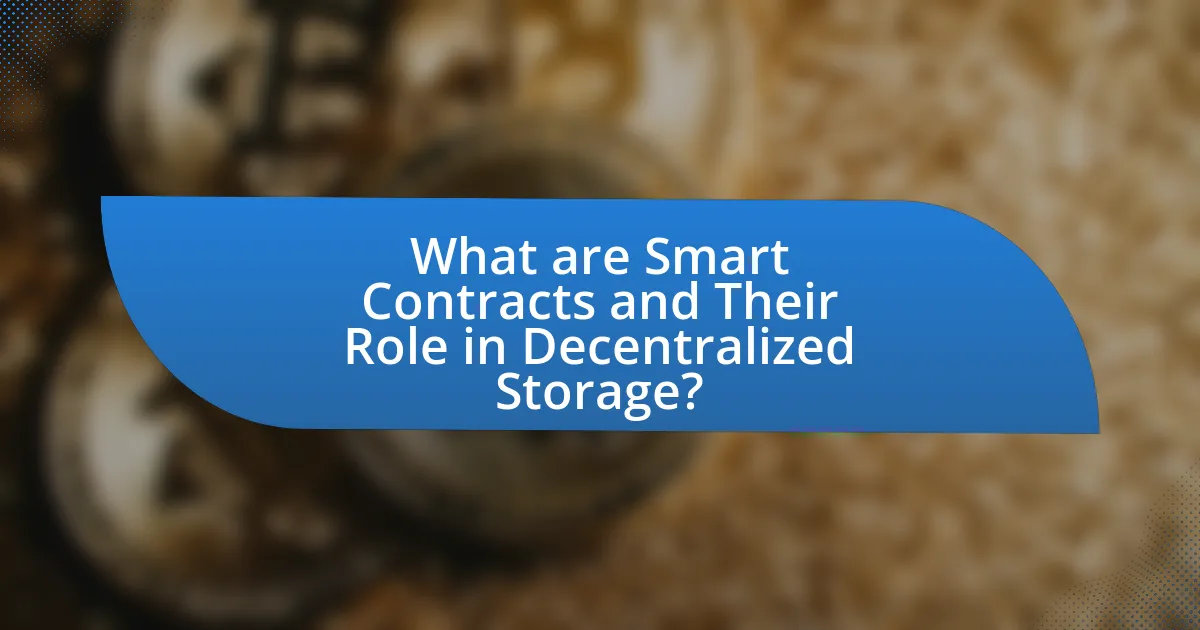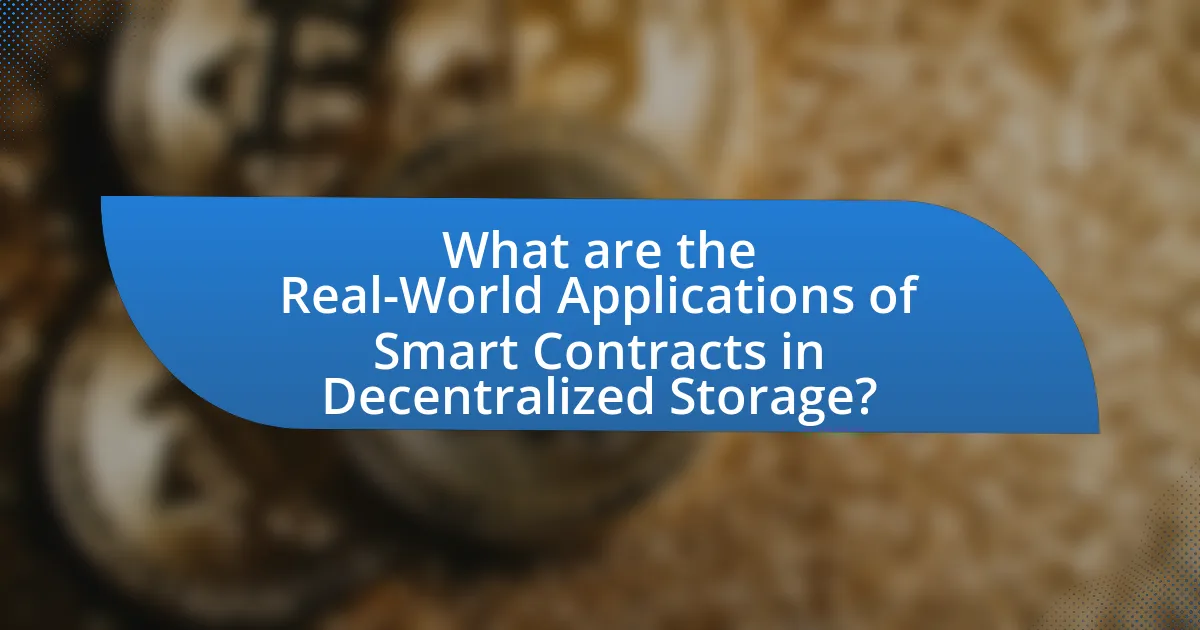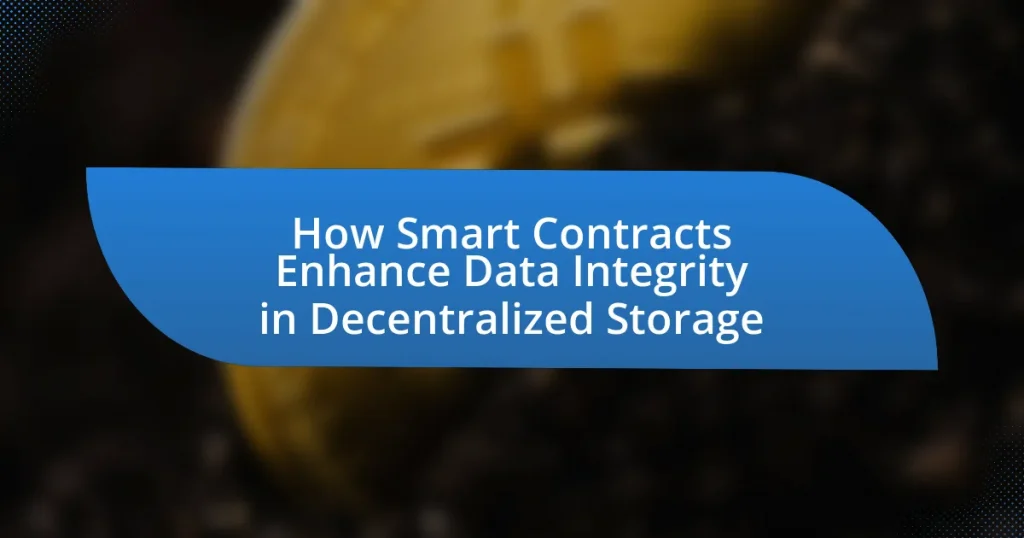Smart contracts are self-executing agreements coded on blockchain technology that play a crucial role in enhancing data integrity within decentralized storage systems. They automate data management processes, ensuring secure transactions and interactions without intermediaries, thereby minimizing risks of data tampering. The article explores how smart contracts function, their key components, and the mechanisms they employ to verify data integrity, including cryptographic techniques and consensus algorithms. Additionally, it addresses the importance of data integrity in decentralized storage, the challenges faced by traditional systems, and the real-world applications of smart contracts across various industries, highlighting their effectiveness in maintaining reliable and secure data management.

What are Smart Contracts and Their Role in Decentralized Storage?
Smart contracts are self-executing contracts with the terms of the agreement directly written into code, operating on blockchain technology. In decentralized storage, smart contracts facilitate automated data management, ensuring that data integrity is maintained through predefined rules and conditions. They enable secure transactions and interactions without the need for intermediaries, thereby reducing the risk of data tampering. For instance, platforms like Ethereum utilize smart contracts to enforce data access permissions and automate data retrieval processes, ensuring that only authorized users can access or modify stored data. This mechanism enhances trust and reliability in decentralized storage systems, as the execution of contracts is transparent and immutable, providing a verifiable audit trail.
How do Smart Contracts function within decentralized storage systems?
Smart contracts function within decentralized storage systems by automating and enforcing agreements between users without the need for intermediaries. They execute predefined conditions, such as data storage, retrieval, and access permissions, ensuring that all transactions are transparent and immutable. For instance, when a user uploads data, a smart contract can automatically verify the transaction, store the data across a distributed network, and manage access rights based on the agreed terms. This process enhances data integrity by preventing unauthorized access and ensuring that all parties adhere to the contract’s stipulations, as evidenced by the use of blockchain technology, which provides a secure and tamper-proof environment for these operations.
What are the key components of Smart Contracts?
The key components of smart contracts include code, conditions, and execution mechanisms. The code defines the rules and logic of the contract, specifying how the contract operates and what actions are to be taken under certain conditions. Conditions are the specific criteria that must be met for the contract to execute, often represented as “if-then” statements. Execution mechanisms are the processes that automatically carry out the contract’s terms once the conditions are satisfied, typically facilitated by blockchain technology, which ensures transparency and immutability. These components work together to create self-executing agreements that enhance data integrity in decentralized storage systems.
How do Smart Contracts ensure automated execution of agreements?
Smart contracts ensure automated execution of agreements by utilizing self-executing code that runs on a blockchain. This code automatically enforces the terms of the contract when predefined conditions are met, eliminating the need for intermediaries. For instance, if a smart contract stipulates that payment is released upon delivery confirmation, the transaction occurs automatically once the delivery is verified on the blockchain. This mechanism enhances trust and reduces the risk of fraud, as the execution is transparent and immutable, meaning that once deployed, the contract cannot be altered.
Why is Data Integrity Important in Decentralized Storage?
Data integrity is crucial in decentralized storage because it ensures that data remains accurate, consistent, and trustworthy across multiple nodes. In decentralized systems, where data is distributed rather than stored in a single location, maintaining integrity prevents unauthorized alterations and data corruption. For instance, blockchain technology, often used in decentralized storage, employs cryptographic hashing to secure data, making it nearly impossible to modify without detection. This mechanism reinforces the reliability of the stored information, as any change would require consensus from the network, thus safeguarding against fraud and errors.
What challenges does data integrity face in traditional storage systems?
Data integrity in traditional storage systems faces several challenges, primarily due to issues such as data corruption, unauthorized access, and lack of transparency. Data corruption can occur from hardware failures, software bugs, or human errors, leading to inaccurate or lost information. Unauthorized access poses a significant risk, as malicious actors can manipulate or delete data, compromising its integrity. Additionally, traditional systems often lack transparency, making it difficult to track changes or verify the authenticity of data, which further undermines trust in the stored information. These challenges highlight the limitations of conventional storage methods in maintaining reliable data integrity.
How does decentralized storage differ in terms of data integrity?
Decentralized storage enhances data integrity by distributing data across multiple nodes, reducing the risk of single points of failure. In contrast to centralized systems, where data integrity can be compromised by a single breach or failure, decentralized storage employs redundancy and cryptographic techniques to ensure that data remains intact and verifiable. For instance, blockchain technology, often used in decentralized storage, provides an immutable ledger that records all transactions, making it nearly impossible to alter data without detection. This structure not only protects against unauthorized changes but also allows users to verify the authenticity of their data through consensus mechanisms, thereby reinforcing data integrity.

How do Smart Contracts Enhance Data Integrity?
Smart contracts enhance data integrity by automating and enforcing the terms of agreements without the need for intermediaries. This automation ensures that data is only altered or accessed under predefined conditions, reducing the risk of unauthorized changes. For instance, once a smart contract is deployed on a blockchain, it operates according to its code, which is immutable and transparent, ensuring that all parties can verify the integrity of the data involved. Additionally, the decentralized nature of blockchain technology means that data is stored across multiple nodes, making it resistant to tampering and fraud. This combination of automation, immutability, and decentralization provides a robust framework for maintaining data integrity in decentralized storage systems.
What mechanisms do Smart Contracts use to verify data integrity?
Smart contracts use cryptographic hashing, consensus algorithms, and decentralized storage to verify data integrity. Cryptographic hashing ensures that any data input into the smart contract generates a unique hash, allowing for easy verification of data authenticity. Consensus algorithms, such as Proof of Work or Proof of Stake, require network participants to agree on the validity of transactions, thereby preventing fraudulent data from being accepted. Additionally, decentralized storage solutions, like IPFS, ensure that data is stored across multiple nodes, making it resistant to tampering and loss. These mechanisms collectively enhance the reliability and integrity of data managed by smart contracts.
How do consensus algorithms contribute to data verification?
Consensus algorithms contribute to data verification by ensuring that all participants in a decentralized network agree on the validity of transactions before they are recorded. These algorithms, such as Proof of Work and Proof of Stake, require nodes to validate data through a predefined set of rules, which minimizes the risk of fraudulent entries. For instance, in Bitcoin’s Proof of Work, miners must solve complex mathematical problems to validate transactions, thereby creating a secure and tamper-proof ledger. This process not only enhances data integrity but also builds trust among users, as the consensus mechanism prevents any single entity from manipulating the data.
What role do cryptographic techniques play in ensuring data integrity?
Cryptographic techniques play a crucial role in ensuring data integrity by providing mechanisms that verify the authenticity and consistency of data. These techniques, such as hashing and digital signatures, create unique representations of data that can be checked for alterations. For instance, when data is hashed, any change in the original data results in a completely different hash value, allowing for easy detection of tampering. Additionally, digital signatures authenticate the identity of the sender and confirm that the data has not been modified during transmission. This is evidenced by the use of SHA-256 hashing in blockchain technology, which underpins the integrity of transactions by ensuring that any alteration is immediately noticeable.
How do Smart Contracts prevent unauthorized data manipulation?
Smart contracts prevent unauthorized data manipulation by utilizing blockchain technology, which ensures that all transactions and data changes are recorded in a tamper-proof manner. Each smart contract operates on a decentralized network, meaning that once deployed, the code cannot be altered without consensus from the network participants. This immutability is reinforced by cryptographic hashing, which links each block of data to the previous one, creating a secure chain that is resistant to unauthorized changes. Additionally, smart contracts execute predefined rules automatically, reducing the risk of human error or malicious intent. The transparency of the blockchain allows all participants to verify the integrity of the data, further deterring unauthorized manipulation.
What are the implications of immutability in Smart Contracts?
Immutability in smart contracts ensures that once deployed, the code cannot be altered, which has significant implications for data integrity and trust. This characteristic prevents unauthorized modifications, thereby safeguarding the contract’s terms and conditions against fraud or manipulation. For instance, the Ethereum blockchain, which hosts numerous smart contracts, guarantees that once a contract is executed, its state is permanently recorded, making it transparent and verifiable by all parties involved. This transparency fosters trust among users, as they can independently verify the contract’s execution without relying on a central authority. Furthermore, immutability enhances security by reducing the risk of vulnerabilities that could arise from code changes, as any bugs or exploits present at deployment remain unchanged. Thus, the implications of immutability in smart contracts are critical for maintaining data integrity and fostering trust in decentralized storage solutions.
How do access controls within Smart Contracts enhance security?
Access controls within smart contracts enhance security by restricting who can execute specific functions or access sensitive data. These controls ensure that only authorized users can perform actions such as modifying contract states or accessing private information, thereby preventing unauthorized access and potential exploitation. For instance, role-based access control can limit permissions based on user roles, ensuring that only designated parties can execute critical functions. This mechanism significantly reduces the risk of malicious attacks and enhances the overall integrity of the decentralized storage system by maintaining strict governance over who can interact with the smart contract.

What are the Real-World Applications of Smart Contracts in Decentralized Storage?
Smart contracts in decentralized storage have several real-world applications, primarily enhancing data integrity and automating processes. One significant application is in decentralized file storage systems like IPFS, where smart contracts facilitate secure and verifiable data sharing among users, ensuring that only authorized parties can access or modify the data. Another application is in supply chain management, where smart contracts can automatically update and verify the status of goods stored in decentralized systems, providing transparency and traceability. Additionally, in healthcare, smart contracts can manage patient data securely, allowing only authorized healthcare providers to access sensitive information while maintaining compliance with regulations. These applications demonstrate how smart contracts can streamline operations and enhance trust in decentralized storage environments.
Which industries are leveraging Smart Contracts for data integrity?
The industries leveraging Smart Contracts for data integrity include finance, supply chain management, healthcare, real estate, and legal services. In finance, Smart Contracts automate transactions and ensure compliance, reducing fraud risks. Supply chain management utilizes Smart Contracts to track product provenance and verify authenticity, enhancing transparency. In healthcare, they secure patient data and streamline consent processes, ensuring data integrity. Real estate employs Smart Contracts for property transactions, automating escrow and title transfers, which minimizes disputes. Legal services use Smart Contracts to enforce agreements automatically, ensuring that terms are met without manual intervention. These applications demonstrate the effectiveness of Smart Contracts in maintaining data integrity across various sectors.
How are healthcare organizations using Smart Contracts for secure data storage?
Healthcare organizations are using smart contracts to facilitate secure data storage by automating access controls and ensuring data integrity through blockchain technology. Smart contracts enable these organizations to create predefined rules for data access, allowing only authorized personnel to retrieve or modify sensitive patient information. This automation reduces the risk of human error and unauthorized access, thereby enhancing data security. For instance, a study published in the Journal of Medical Internet Research highlights that implementing smart contracts can significantly improve the confidentiality and integrity of electronic health records by providing a tamper-proof audit trail.
What examples exist in the finance sector for Smart Contracts enhancing data integrity?
Smart contracts enhance data integrity in the finance sector through applications such as automated clearinghouses and decentralized finance (DeFi) platforms. For instance, in automated clearinghouses, smart contracts facilitate real-time settlement of transactions, ensuring that data is consistently accurate and tamper-proof. Additionally, DeFi platforms like Aave and Compound utilize smart contracts to manage lending and borrowing, where the terms and conditions are encoded directly into the contract, reducing the risk of data manipulation. These implementations demonstrate that smart contracts can significantly improve data integrity by providing transparent, immutable records of transactions.
What are the potential challenges and limitations of using Smart Contracts?
The potential challenges and limitations of using Smart Contracts include issues related to code vulnerabilities, legal enforceability, and scalability. Code vulnerabilities arise because Smart Contracts are immutable once deployed, meaning any bugs or security flaws can lead to significant financial losses, as evidenced by incidents like the DAO hack in 2016, where $60 million was stolen due to a coding error. Legal enforceability is another challenge, as the legal status of Smart Contracts varies by jurisdiction, creating uncertainty in their recognition and enforcement in traditional legal systems. Additionally, scalability issues can arise from network congestion and high transaction fees, particularly on platforms like Ethereum, where increased demand can slow down processing times and increase costs, impacting the efficiency of Smart Contracts in real-world applications.
How can coding errors in Smart Contracts affect data integrity?
Coding errors in Smart Contracts can significantly compromise data integrity by allowing unintended actions or outcomes to occur. For instance, a flaw in the contract’s code may enable unauthorized access to sensitive data or permit incorrect data modifications, leading to inconsistencies in the stored information. A notable example is the DAO hack in 2016, where a vulnerability in the Smart Contract code resulted in the loss of $50 million worth of Ether, demonstrating how coding errors can directly impact the integrity of data managed by Smart Contracts.
What are the scalability issues associated with Smart Contracts in decentralized storage?
Scalability issues associated with Smart Contracts in decentralized storage primarily stem from network congestion and transaction throughput limitations. As the number of users and transactions increases, the underlying blockchain networks can become overloaded, leading to slower transaction times and higher fees. For instance, Ethereum, a popular platform for Smart Contracts, has faced significant scalability challenges, particularly during peak usage periods, where transaction costs surged to over $50 in 2021. Additionally, the execution of complex Smart Contracts requires substantial computational resources, which can further strain the network and limit scalability. These factors collectively hinder the ability of decentralized storage solutions to efficiently handle large volumes of data and transactions.
What best practices should be followed when implementing Smart Contracts for data integrity?
To ensure data integrity when implementing Smart Contracts, developers should follow best practices such as thorough testing, clear documentation, and using established standards. Thorough testing involves conducting unit tests, integration tests, and formal verification to identify vulnerabilities and ensure the contract behaves as intended. Clear documentation helps stakeholders understand the contract’s functionality and logic, reducing the risk of misuse or misinterpretation. Utilizing established standards, such as ERC-20 for tokens or ERC-721 for non-fungible tokens, promotes interoperability and security, as these standards have been vetted by the community. These practices collectively enhance the reliability and security of Smart Contracts, thereby safeguarding data integrity in decentralized storage systems.
How can organizations ensure the security of their Smart Contracts?
Organizations can ensure the security of their Smart Contracts by implementing rigorous testing and auditing processes. Conducting thorough code reviews and utilizing automated testing tools can identify vulnerabilities before deployment. Additionally, engaging third-party security firms for comprehensive audits can provide an external validation of the contract’s security. According to a report by ConsenSys, 70% of Smart Contracts contain vulnerabilities, highlighting the necessity of these measures. Furthermore, organizations should adopt best practices such as using established frameworks and libraries, which have been vetted by the community, to minimize risks associated with custom code.
What steps can be taken to audit Smart Contracts effectively?
To audit smart contracts effectively, one must follow a systematic approach that includes several key steps. First, conduct a thorough code review to identify vulnerabilities and ensure compliance with best practices. This involves examining the smart contract’s code for common issues such as reentrancy, overflow, and underflow vulnerabilities.
Next, utilize automated tools like static analysis software to detect potential security flaws and inefficiencies in the code. Tools such as Mythril and Slither can provide insights into the contract’s behavior and highlight areas of concern.
Following the automated analysis, perform manual testing, including unit tests and integration tests, to validate the functionality of the smart contract under various scenarios. This step ensures that the contract behaves as intended and meets the specified requirements.
Additionally, consider engaging third-party auditors who specialize in smart contract security. Their expertise can provide an independent assessment and uncover issues that may have been overlooked.
Finally, conduct a formal verification process, if applicable, to mathematically prove that the smart contract adheres to its specifications. This step is crucial for high-stakes applications where security is paramount.
These steps collectively enhance the reliability and security of smart contracts, thereby reinforcing data integrity in decentralized storage systems.


